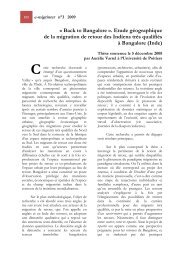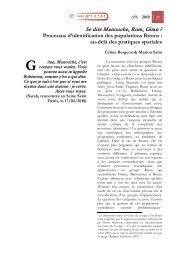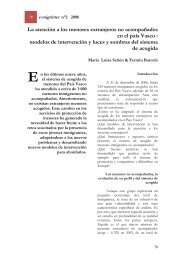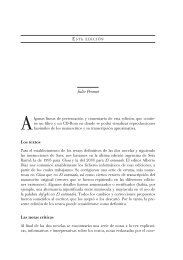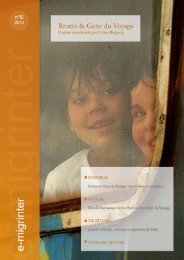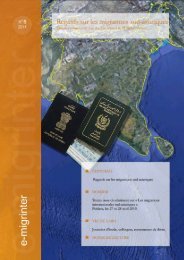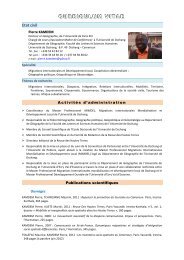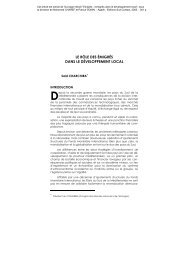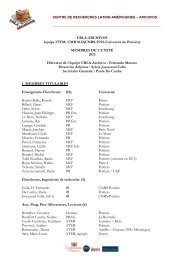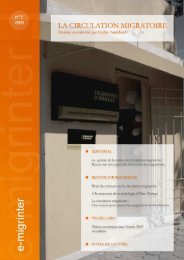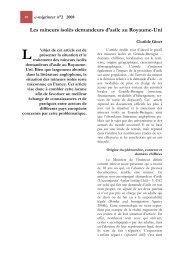e-migrinter 2010 numéro 05 - Maison des Sciences de l'Homme et ...
e-migrinter 2010 numéro 05 - Maison des Sciences de l'Homme et ...
e-migrinter 2010 numéro 05 - Maison des Sciences de l'Homme et ...
You also want an ePaper? Increase the reach of your titles
YUMPU automatically turns print PDFs into web optimized ePapers that Google loves.
n°5 <strong>2010</strong> 61<br />
economic consi<strong>de</strong>rations for companies<br />
hiring skilled migrants (e.g. Raunio, 2001;<br />
20<strong>05</strong>), some is from the perspective of the<br />
skilled migrants themselves, on their<br />
motivations and choices (Raunio, 2002a;<br />
2002b; 2003). His research gives some<br />
insight into the motivations of skilled<br />
migrants coming to Finland.<br />
Because of the globalization of<br />
economy, skilled migrants move and work in<br />
a ‘global field of choices’ that consists of<br />
interconnected no<strong><strong>de</strong>s</strong> or places (rather than<br />
states and cities per se). Finland does not<br />
fare well in this field. It is often consi<strong>de</strong>red<br />
distant, expensive, unfamiliar and cold. In<br />
addition, Finnish migration and labour<br />
policies and their late awakening to the<br />
comp<strong>et</strong>ition for global talent create a major<br />
problem; Finland is very little known even as<br />
a viable option for skilled migrants. Raunio<br />
notes that an actual absence of knowledge<br />
creates doubts about the chances of a<br />
country to offer meaningful career<br />
opportunities or even a <strong>de</strong>cent quality living<br />
environment (Raunio and Sotarauta, 20<strong>05</strong>).<br />
In this way Finland’s little known reputation<br />
may place it outsi<strong>de</strong> the ‘global field of<br />
choices’ all tog<strong>et</strong>her.<br />
Actors in this field of choices can be<br />
said to follow three types of reasoning: there<br />
are ‘global nomads’ following economic<br />
opportunities, ‘quality-of-life migrants’ and<br />
those migrating for social relationships (like<br />
marriage and family) (2002b:6, see also<br />
Forsan<strong>de</strong>r <strong>et</strong> al [2004:121] for similar<br />
division). In a number of cases the reasons<br />
for coming to Finland were related to social<br />
relations. However, Raunio finds the<br />
majority of his informants to follow the<br />
‘global nomads’-logic, motivated by career<br />
advancement and financial gain. Other<br />
studies (e.g. Hautala, 2006) contradict this<br />
and name ‘quality-of-life’ migration as the<br />
main motivation among skilled migrants<br />
coming to Finland.<br />
Raunio and Sotarauta’s later research<br />
(20<strong>05</strong>) shows that Finland is rarely chosen<br />
because of itself. Rather it is chosen because<br />
of the job that has been acquired prior to<br />
coming to Finland. Similarly, Trux (2002)<br />
has found that people choose to work here<br />
not because of Finland or because of<br />
particular company per se, rather because of<br />
the combination of both of them as a<br />
package, and in careful comparisons to other<br />
(often global) options. Also, again, a central<br />
role in this package is played by existing<br />
social relations in Finland.<br />
The good and the bad: committing and<br />
distancing factors<br />
Those that do choose Finland, report<br />
to appreciating it because of the low-stress<br />
character of working conditions and<br />
flexibility of the workplace. This relates to<br />
long holidays, short working days, and<br />
consi<strong>de</strong>ration for family responsibilities<br />
(Raunio, 2003). Finnish working culture is<br />
also consi<strong>de</strong>red a ‘humane alternative to<br />
Silicon Valley’ for the possibilities it offers to<br />
combine work and family life (Forsan<strong>de</strong>r<br />
and Trux, 2002:230). Other positive points<br />
have been named as equality, saf<strong>et</strong>y and the<br />
generally slow pace of life (Forsan<strong>de</strong>r and<br />
Raunio, 20<strong>05</strong>), as well as nature and<br />
cleanliness (Raunio, 2003).<br />
Finnish mo<strong><strong>de</strong>s</strong> of interaction,<br />
associated with poor communication skills<br />
and limited conversation, were seen as<br />
distancing factors. This also relates to an<br />
often reported difficulty in forming social<br />
relationships, both with Finns as well as<br />
other foreigners. Raunio’s research shows<br />
that forming friendships and acquiring<br />
acquaintances is felt to be especially difficult<br />
in Finland because of the small sizes of<br />
foreign nationality-clusters. There are also<br />
marked differences in social interaction<br />
b<strong>et</strong>ween the immigrants’ own culture and<br />
Finnish culture, and the Finns are felt to be<br />
unfamiliar with foreigners and<br />
multiculturalism in general (2002b).<br />
Trux (2002) also reports<br />
disappointment in the language skills of



